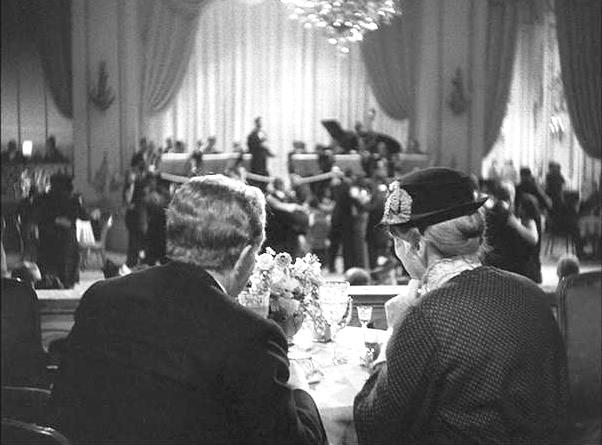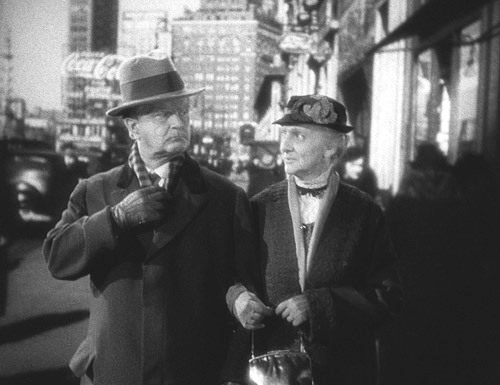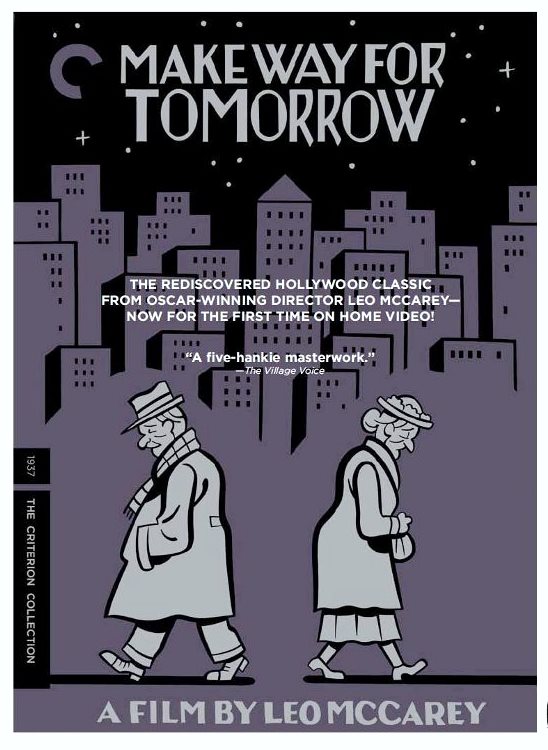
“Honor Thy Father and Thy Mother.”
Has old-movie musk for about five minutes, but then it grabs you. Make Way for Tomorrow (1937), examines an elderly couple that has to be split up, one of them inevitably headed to an old folks home and the other across the country to California to live with estranged family. It’s about their final day out, after fifty years of marriage, the last hours of togetherness they will be left to have. Director Leo McCarey suggests the Great Depression as a cause to the woes without ever mentioning Great Depression of liberal social injustices. Politics aside, it builds to a heart-shattering conclusion, one fraught of powerful emotion that is incomparable to other films from that time period.
Barkley (Victor Moore) and his wife Lucy (Beulah Bondi) gather their children for a reunion to let them know they have lost their home to the bank. They have a humble plan, which they don’t really share. The children have families of their own, but say they can accommodate them for a short while. Dad will sleep on one of his son’s couches. Mom will sleep on her granddaughter’s bed in another’s son’s home, both addresses divided by distance.
Lucy interrupts her daughter-in-law’s bridge game, simply by having a presence in the home. The granddaughter takes her to the movies and then deserts her there, and leaves her waiting until afterwards. Lucy is yelled at later for lying on behalf of the granddaughter who was sneaking away with boys. It’s only been a short while, but Lucy is already wearing out her welcome.
The quarters aren’t too swell for Barkley either. It’s a cramped space, he catches pneumonia and must recover, and damn it all, is decided by his son that it’s just not working out. Barkley still believes he can rebound, get a job after being jobless for four years, and let his wife move back in with him somewhere. He knows his skills are outmoded, but he tries his best.
In both cases, Barkley and Lucy are a burden to their children who are much too busy to take care of them “properly.” The inevitability comes that one of them will have to move to California to be looked after by a daughter (one of the children we never see). The kids prepare a farewell dinner for their folks, but nary comprehend they want their own privacy. Barkley and Lucy find themselves on a fine day out in New York City, a reminiscence of their honeymoon, and become not so certain they want to share this day with their children.
They have some luck. A car dealer accommodates them to a ride in a fancy automobile after he mistakes them for rich. When the dealer realizes they have no money, he doesn’t get surly but is glad to have fulfilled a special moment for them. Barkley and Lucy recall the Vogard Hotel from years back, and ask to be dropped off there. They are pleased it’s still standing, and go in for cocktails. A little buzzed, they are at ease away from their kids. They recount the history of their love story, speak of regrets, define their love for one another. All these moments are so touching to see them respond to each other in the way they do.
 These are great performances for not only the 1930’s but for all-time, and the shock is that Moore and Bondi are playing characters in their 70’s, but were younger actually. Moore was 61, while Bondi was not yet 50, both of them craggily embodying their characters. I suppose I’m more touched by Bondi in a number of her nuances, if I had to pick one over the other. Here’s Lucy, her character, who is older than 70 but still remembers what it’s like to be 25. It’s her body that has defeated her. The Great Depression, the hard times and struggles of not enough food or substantial exercise, would be one cause for accelerating old age.
These are great performances for not only the 1930’s but for all-time, and the shock is that Moore and Bondi are playing characters in their 70’s, but were younger actually. Moore was 61, while Bondi was not yet 50, both of them craggily embodying their characters. I suppose I’m more touched by Bondi in a number of her nuances, if I had to pick one over the other. Here’s Lucy, her character, who is older than 70 but still remembers what it’s like to be 25. It’s her body that has defeated her. The Great Depression, the hard times and struggles of not enough food or substantial exercise, would be one cause for accelerating old age.
“The Wizard of Oz” is the greatest film of the 1930’s, and while I love “City Lights,” “Trouble in Paradise” and King Kong,” the long forgotten “Make Way for Tomorrow” would be my number two selection. For one, the uncompromising ending which McCarey refused to re-shoot despite studio executives desire to change it. Barkley is catching the train, he must say his goodbyes, but to hide it they say to each other this is all just for now. The versatile McCarey won a Best Director Oscar in 1937 but it was for his screwball comedy “The Awful Truth.” When he went up to the podium he said, “I would like to thank the Academy, but you gave it to me for the wrong picture.”
92 Minutes. Unrated.
DRAMA / TEENS AND UP / MASTERPIECE VIEWING
Film Cousins: “Umberto D.” (1952, Italy); “Tokyo Story” (1953, Japan); “On Golden Pond” (1981); “Amour” (2012, Austria).





